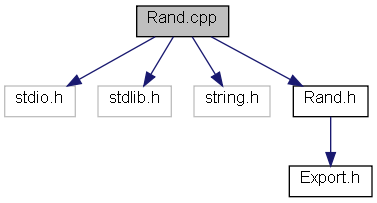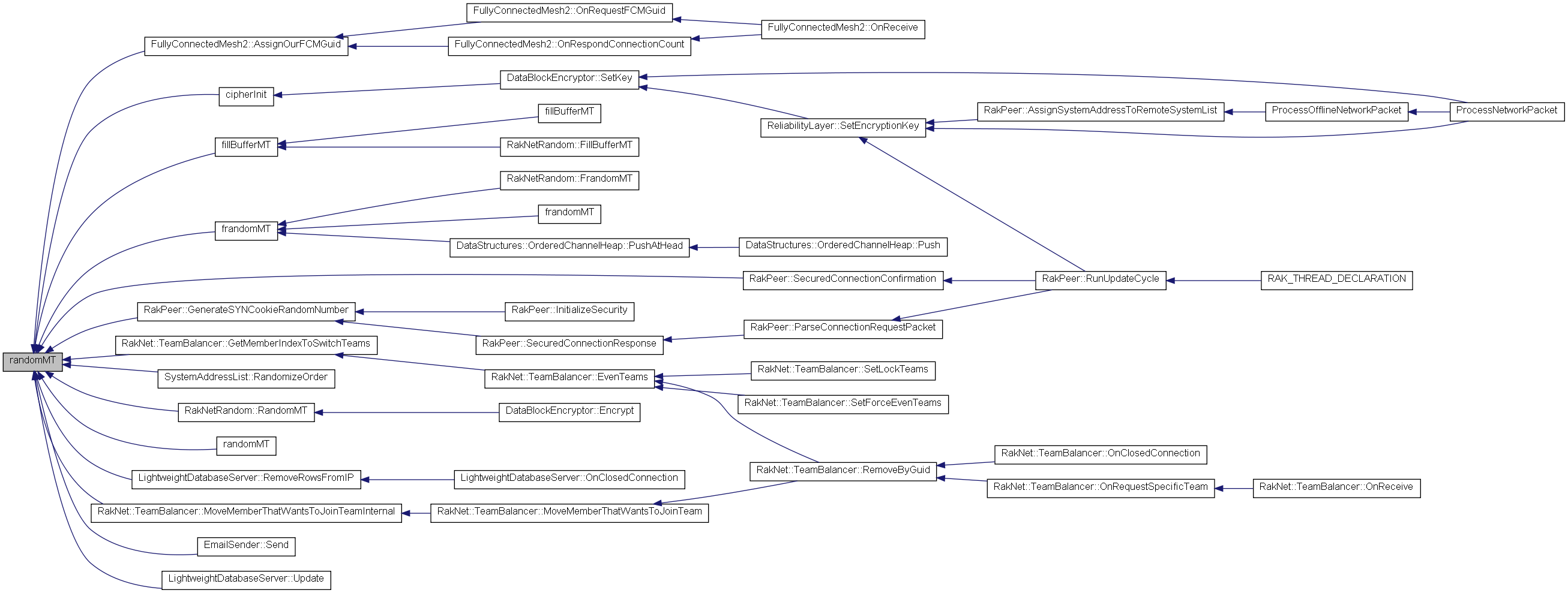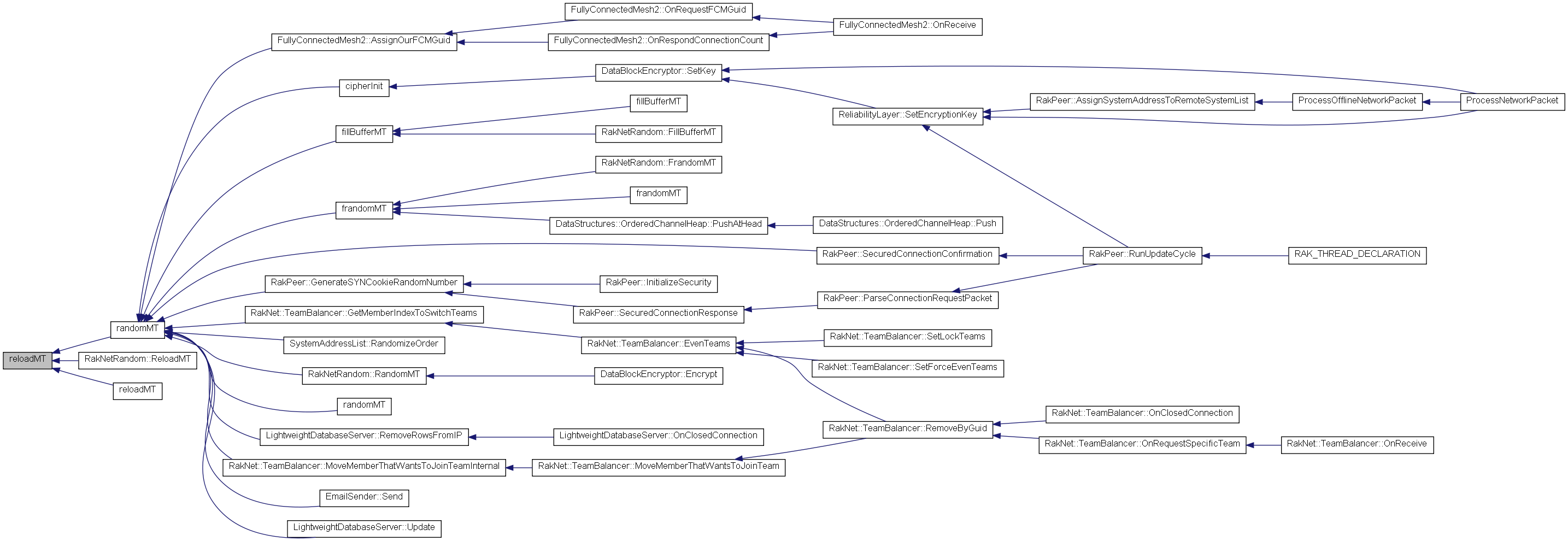#include <stdio.h>#include <stdlib.h>#include <string.h>#include "Rand.h"
Go to the source code of this file.
Defines | |
| #define | N (624) |
| #define | M (397) |
| #define | K (0x9908B0DFU) |
| #define | hiBit(u) ((u) & 0x80000000U) |
| #define | loBit(u) ((u) & 0x00000001U) |
| #define | loBits(u) ((u) & 0x7FFFFFFFU) |
| #define | mixBits(u, v) (hiBit(u)|loBits(v)) |
Functions | |
| void | seedMT (unsigned int seed, unsigned int *state, unsigned int *&next, int &left) |
| unsigned int | reloadMT (unsigned int *state, unsigned int *&next, int &left) |
| unsigned int | randomMT (unsigned int *state, unsigned int *&next, int &left) |
| void | fillBufferMT (void *buffer, unsigned int bytes, unsigned int *state, unsigned int *&next, int &left) |
| float | frandomMT (unsigned int *state, unsigned int *&next, int &left) |
| void | seedMT (unsigned int seed) |
| unsigned int | reloadMT (void) |
| unsigned int | randomMT (void) |
| float | frandomMT (void) |
| void | fillBufferMT (void *buffer, unsigned int bytes) |
Define Documentation
| #define N (624) |
Grabbed by Kevin from http://www.math.keio.ac.jp/~matumoto/cokus.c This is the ``Mersenne Twister'' random number generator MT19937, which generates pseudorandom integers uniformly distributed in 0..(2^32 - 1) starting from any odd seed in 0..(2^32 - 1). This version is a recode by Shawn Cokus (Cokus@math.washington.edu) on March 8, 1998 of a version by Takuji Nishimura (who had suggestions from Topher Cooper and Marc Rieffel in July-August 1997).
Effectiveness of the recoding (on Goedel2.math.washington.edu, a DEC Alpha running OSF/1) using GCC -O3 as a compiler: before recoding: 51.6 sec. to generate 300 million random numbers; after recoding: 24.0 sec. for the same (i.e., 46.5% of original time), so speed is now about 12.5 million random number generations per second on this machine.
According to the URL <http://www.math.keio.ac.jp/~matumoto/emt.html> (and paraphrasing a bit in places), the Mersenne Twister is ``designed with consideration of the flaws of various existing generators,'' has a period of 2^19937 - 1, gives a sequence that is 623-dimensionally equidistributed, and ``has passed many stringent tests, including the die-hard test of G. Marsaglia and the load test of P. Hellekalek and S. Wegenkittl.'' It is efficient in memory usage (typically using 2506 to 5012 bytes of static data, depending on data type sizes, and the code is quite short as well). It generates random numbers in batches of 624 at a time, so the caching and pipelining of modern systems is exploited. It is also divide- and mod-free.
Licensing is free http://www.math.sci.hiroshima-u.ac.jp/~m-mat/MT/MT2002/elicense.html
The code as Shawn received it included the following notice:
Copyright (C) 1997 Makoto Matsumoto and Takuji Nishimura. When you use this, send an e-mail to <matumoto@math.keio.ac.jp> with an appropriate reference to your work.
It would be nice to CC: <Cokus@math.washington.edu> when you write.
Function Documentation
| void fillBufferMT | ( | void * | buffer, | |
| unsigned int | bytes, | |||
| unsigned int * | state, | |||
| unsigned int *& | next, | |||
| int & | left | |||
| ) |
| void fillBufferMT | ( | void * | buffer, | |
| unsigned int | bytes | |||
| ) |
Randomizes a buffer
- Note:
- not threadSafe, use an instance of RakNetRandom if necessary per thread
Definition at line 88 of file Rand.cpp.

| float frandomMT | ( | void | ) |
Gets a random float
- Note:
- not threadSafe, use an instance of RakNetRandom if necessary per thread
- Returns:
- 0 to 1.0f, inclusive
Definition at line 84 of file Rand.cpp.

| float frandomMT | ( | unsigned int * | state, | |
| unsigned int *& | next, | |||
| int & | left | |||
| ) |
| unsigned int randomMT | ( | unsigned int * | state, | |
| unsigned int *& | next, | |||
| int & | left | |||
| ) |
| unsigned int randomMT | ( | void | ) |
Gets a random unsigned int
- Note:
- not threadSafe, use an instance of RakNetRandom if necessary per thread
- Returns:
- an integer random value.
Definition at line 80 of file Rand.cpp.

| unsigned int reloadMT | ( | void | ) |
| unsigned int reloadMT | ( | unsigned int * | state, | |
| unsigned int *& | next, | |||
| int & | left | |||
| ) |
| void seedMT | ( | unsigned int | seed, | |
| unsigned int * | state, | |||
| unsigned int *& | next, | |||
| int & | left | |||
| ) |
| void seedMT | ( | unsigned int | seed | ) |
Initialise seed for Random Generator
- Note:
- not threadSafe, use an instance of RakNetRandom if necessary per thread
- Parameters:
-
[in] seed The seed value for the random number generator.
Definition at line 72 of file Rand.cpp.











 1.7.1
1.7.1